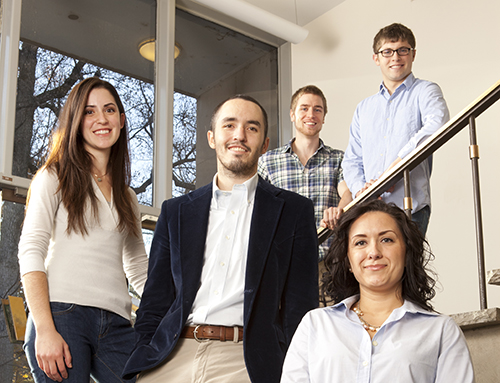 When Vanderbilt Law School launched its Admission Interview Program in fall 2007, one of the first requests the Admissions Office fielded was from a prospective student in Seoul, Korea. “He assumed he’d need to do the interview on Skype,” Dean of Admissions Todd Morton said. “I was delighted we were able to say, ‘We have an alumni interviewer in Seoul, and we can set you up with an in-person interview.'”
When Vanderbilt Law School launched its Admission Interview Program in fall 2007, one of the first requests the Admissions Office fielded was from a prospective student in Seoul, Korea. “He assumed he’d need to do the interview on Skype,” Dean of Admissions Todd Morton said. “I was delighted we were able to say, ‘We have an alumni interviewer in Seoul, and we can set you up with an in-person interview.'”
In the four years since the program’s launch, the number of admitted students who accept Vanderbilt’s offer of admission who were interviewed during the admission process has increased steadily. A third of the Class of 2014—64 students—were interviewed by a Vanderbilt Law graduate. Morton believes that, in addition to offering his Admissions team an evaluation of a prospective student, alumni do an outstanding job of promoting Vanderbilt as an excellent choice for law school. “When students meet our alumni, they want to join the Vanderbilt Law community,” he said.
The Admission Interview Program emerged from a conversation between Morton and Dean Ed Rubin soon after both joined the law school in 2005. The number of Vanderbilt applications had experienced a sharp uptick, and Morton, who reads every application, wanted a way to learn more about students whose applications reflected similarly impressive accomplishments and educational records. He was also struck by the unique level of alumni support for and loyalty to the school. “The depths of affection and appreciation Vanderbilt alumni have for the law school are really extraordinary,” Morton said. “We decided to establish a program through which prospective students could request an interview with a Vanderbilt Law graduate in their area, because we realized that our alumni are uniquely situated to help us identify and attract students who will benefit from the special experience Vanderbilt offers.”
The program also differentiated Vanderbilt’s admissions process from those at other law schools. Only one other law school —Northwestern University—offers in-person alumni interviews to all applicants as part of the application process. Morton hired Associate Director of Admissions Christina Williams, who previously worked in Vanderbilt University’s Undergraduate Admissions Office, to set up and manage the program. The program’s 2007 launch came after two years of hard work establishing processes for students to request interviews and for interviewers to evaluate candidates and assembling a network of volunteers. “Finding enough volunteers to launch the program actually turned out to be the easy part,” Morton said. “We sent out an email asking for volunteers and had a great response.”
In addition to providing valuable feedback about applicants, the program acquaints prospective students with the broad reach of Vanderbilt’s alumni network. “There aren’t very many areas where we don’t have alumni volunteers,” Associate Director of Admissions Williams said, “and on the rare occasions when I do get a request where I don’t yet have a volunteer, I send out an email and typically find someone willing do the interview almost immediately.”
Victoria applies a metric to his interview evaluations that Admissions Dean Morton and Career Services Assistant Dean Elizabeth Workman appreciate: “Is this someone I would consider hiring?” The more than 1,600 interviews Vanderbilt alumni conducted help ensure that the law school admits students who are not only well qualified, but who alumni believe will make good employees once they graduate. The interviews also help applicants. “More information promotes better decisions,” Morton said. “That’s my mantra, and it fits here. We interviewed 37 percent of our applicant pool last year, and people who interviewed had a substantially higher admission rate than those who did not interview.”
Combining alumni interviews with the interviews conducted by Morton and his admissions team, 91 of the 194 members of the Class of 2014 were interviewed. “The program has had a huge and hugely positive impact,” Dean Chris Guthrie said, “and it works so well because Vanderbilt has such a strong network of alumni who had a great experience here. Their participation in our admissions process makes Vanderbilt stronger, and I’m extremely grateful for the help they give us in doing these interviews.”
 Waylon Bryson ’14, interviewed by Andrew Morrison ’98
Waylon Bryson ’14, interviewed by Andrew Morrison ’98
Waylon Bryson ’14 took the train from Sendai, Japan, where he was working as an English teacher, to Tokyo for his February 2011 interview with Andrew Morrison ’98, a partner with Morrison & Foerster. Weeks later, Sendai was near the epicenter of a powerful earthquake that triggered a deadly tsunami and set buildings in Tokyo, almost 200 miles away, swaying. Concerned, Morrison called Bryson’s cell phone; Bryson discovered the message days later, when his phone service was finally restored. Bryson recalls the ground shaking almost continually with aftershocks for more than a month. “The ground was still moving when I left Japan,” he said.
An Oregon native who earned a degree in philosophy from Washington State University, Bryson had planned to start law school after his four-year teaching stint. Although he had researched Vanderbilt along with other top law schools, his impression of the Vanderbilt community came primarily through his interview with Morrison. “Mr. Morrison took the interview very seriously, and he was genuinely enthusiastic about Vanderbilt,” Bryson said. For his part, Morrison liked the fact that Bryson had sent writing samples. “He was interesting and articulate, and I thought he could add to the Vanderbilt community,” Morrison said.
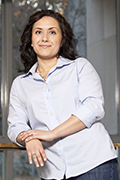 Monroe Solomon ’14, interviewed by McKinley Wooten ’91
Monroe Solomon ’14, interviewed by McKinley Wooten ’91
As the first member of her family to graduate from college, Monroe Solomon ’14 was concerned about the diversity of the student body in terms of the backgrounds, ages and career ambitions of the students. A native of San Antonio, Texas, Solomon worked for two Fortune-500 companies after high school before starting community college at age 24 after moving to Raleigh, North Carolina. Her success there encouraged her to transfer to the University of North Carolina at Chapel Hill, where she earned a degree in sociology. She started law school at age 28 and is married. “When I saw that Vanderbilt offered interviews, I signed up,” she said. “After meeting with Mr. Wooten, I wanted to visit and apply to Vanderbilt.”
Her interviewer, McKinley Wooten ’91, is a deputy director in the North Carolina Administrative Office of the Courts. Wooten earned his undergraduate degree at Morehouse and had shared Solomon’s concern about diversity when he was applying to law schools. “I discovered that Vanderbilt had a lot of geographic diversity and diversity of viewpoints,” Wooten said. “My class included moms who had decided to come back to school, students who had worked a few years and students who had come straight from college and people from all over the country, and it made for a good mix. In these interviews, I’m looking for students who will fit in well with a good, diverse student body, and who are really interested in the environment of the law school and what they can learn from fellow students as well as in the classroom. Monroe reminded me of my classmates.”
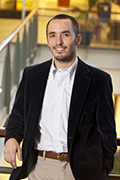 Eric Schoppe ’14, interviewed by Scott Valby ’81
Eric Schoppe ’14, interviewed by Scott Valby ’81
A native of Conroe, Texas, Eric Schoppe ’14 applied to Vanderbilt because he was interested in a small law school and an opportunity to live in a different part of the country. Schoppe had earned a master’s in accounting at the University of Texas and then declined an offer from accounting giant Deloitte & Touche in order to work for a small accounting firm in Austin that supported technology start-ups. Working with start-ups impressed him with the value of a law degree combined with a business education; he plans to earn Vanderbilt’s Law and Business Certificate. “My first impression of Vanderbilt Law School was my interview with Scott Valby,” he said. “It was really important to hear from such a nice guy that Vanderbilt was a collegial school. I’m from a small town in Texas, so a welcoming atmosphere was really attractive, and that impression was confirmed when I came for Admitted Students Day.”
Scott Valby ’81 who interviewed Schoppe, also made a favorable impression because of his entrepreneurial success. In addition to a high-level real estate law practice, Valby has established a company that provides private-label mortgage loan origination services and mortgage loan closing documents for lending institutions throughout the U.S. He volunteered to interview prospective students because “I love Vanderbilt,” he said. “I earned my undergraduate degree there, I’m very proud of my Vanderbilt law degree, and I want to do everything I can do make sure the law school gets students with intellectual creativity and strong work ethics who will make outstanding lawyers.”
Like many interviewers, Valby looks for candidates he believes will thrive in Vanderbilt’s collegial culture. “When I do an interview, I ask myself whether this is someone who will fit into the Vanderbilt community and whether I believe they would be successful in a way that will reflect positively on the school,” Valby said. “I’m looking for someone who wants to make a difference and stand out. Eric was very bright and very unique—he definitely struck me as someone who is going to make a difference.”
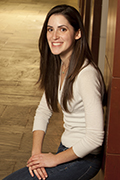 Lauren Smith ’14, interviewed by Mary Ann Miranda ’02
Lauren Smith ’14, interviewed by Mary Ann Miranda ’02
A native of Lexington, Kentucky, Mary Ann Miranda, Class of 2002, is a permanent clerk for Senior Judge Joseph M. Hood in the U.S. District Court for the Eastern District of Kentucky and has taught as an adjunct law professor at the University of Kentucky. She recalls applying to law school “at the point where LSAT scores were going through the roof” and was gratified when Vanderbilt announced its interview program. “I wish I’d had an opportunity to do an interview,” she said. “I remember feeling like there was a part of my application that you couldn’t see on its face, and that’s why I wanted to give that opportunity to Vanderbilt applicants. When you sit down with somebody and look them in the eye, you get a sense of which students are more poised and which are more likely to participate in classroom discussions and out-of-classroom experiences at the law school. You need certain communication skills to be a lawyer, and I can tell who has them in a one-on-on interview.”
Lauren Smith, also a Kentucky native, and Miranda connected immediately because both had found their study abroad programs a life-changing experience. “She looks on paper like many other talented and accomplished young women or men,” Miranda said. “In person, she had remarkable poise, and we had an extraordinary conversation about the unexpected things you find when you live outside your comfort zone in another culture. Her enthusiasm for that experience told me so much about her personality and her ability to perform in almost any setting.”
Smith was favorably impressed that Vanderbilt offered optional interviews and that Miranda had clerked after graduating from law school, as she plans to apply for a clerkship, and her positive experience at Admitted Students Day confirmed her decision to choose Vanderbilt. When another school admitted her from their waiting list over the summer, she declined. “The interview definitely helped with the decision to choose Vanderbilt,” Smith said.
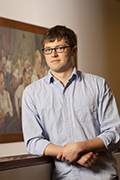 Peter Coulson ’14, interviewed by Richard Victoria ’95
Peter Coulson ’14, interviewed by Richard Victoria ’95
As a native of Pittsburgh and graduate of the University of Notre Dame, Richard Victoria ’95 had never been to Tennessee when he applied to Vanderbilt Law School. “After four years of lake-effect snow in South Bend, it was time for a change,” he said. “When I visited Tennessee, I couldn’t believe how nice Nashville and the Vanderbilt campus were.” When Victoria received an email asking alumni to consider conducting interviews four years ago, he volunteered immediately. “I thought it was a good way to give back,” he recalled. “I’m there to sell the law school on one hand, but on the other to see if this person is a good fit for Vanderbilt.” He has done as few as one and as many as four interviews in a year, and he recalls Peter Coulson, then a senior at Colgate University, as “the best interview I’ve ever had. Everyone we interview in this process has a great resume and great grades, but Peter’s personality seemed particularly suited for Vanderbilt. He wanted a law school with a collegial atmosphere, and he could immediately engage in conversation with someone he’d never met before.”
The fact that Vanderbilt was actually eager to interview prospective students made a positive impression on Coulson, who is also a Pittsburgh native. “Vanderbilt was interested in me enough that they wanted to meet with me in person, and that was intriguing,” Coulson said. “I gained most of my understanding about what differentiates Vanderbilt from other schools from the interview.”